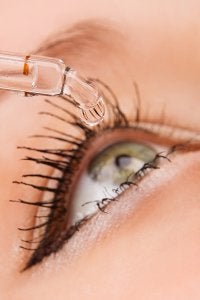-
What Causes Glaucoma to Develop?
Glaucoma causes a buildup of pressure inside of the eye that can result in worsening damage to the eye’s optic nerve over time. Because many people don’t experience any symptoms of glaucoma, it’s crucial to visit your eye doctor or ophthalmologist in Chicago regularly for eye exams and eye care to spot this condition as early as possible. If you have a family history of glaucoma and are over 40 years old, you should visit your eye doctor at least once a year for a glaucoma screening.
Watch this video for some valuable information about what causes glaucoma to develop. Glaucoma typically develops due to genetics and age.
-
Eye Complications of Diabetes
 If you suffer from diabetes, it’s crucial that you visit your eye doctor in Chicago regularly for eye exams and eye care. Diabetes increases your risk of developing dangerous and permanent eye complications, and diabetes complications can even result in blindness. Here is a look at some common eye complications of diabetes.
If you suffer from diabetes, it’s crucial that you visit your eye doctor in Chicago regularly for eye exams and eye care. Diabetes increases your risk of developing dangerous and permanent eye complications, and diabetes complications can even result in blindness. Here is a look at some common eye complications of diabetes.Glaucoma
Once you have been diagnosed with diabetes, your risk of developing glaucoma increases by 40%. Your risk continues to increase with age, and depending upon how long you have had diabetes. Glaucoma is caused by a build up of pressure in the eyes, which causes the fluid in the eye to drain slowly and build up in the anterior chamber. This pressure can irritate or damage the blood vessels in the eye. Over time, the blood vessels become less effective at carrying blood to the retina and optic nerve, and this blood vessel damage may lead to vision loss. Your ophthalmologist may recommend medication or eye surgery to treat glaucoma.
Cataracts
People with diabetes are 60% more likely to develop cataracts than people who don’t have diabetes. If you have diabetes, you are also more likely to develop cataracts at a much younger age, and the condition may progress faster. Cataracts cause the lens of the eye to become clouded, resulting in poor vision, light sensitivity, and progressive vision problems. Your eye doctor may first recommend conservative cataract treatment via eyeglasses or contact lenses. If your cataracts are severe or aren’t remedied by vision correction, your eye doctor will refer you to a cataract surgeon for cataract surgery.
Diabetic Retinopathy
Diabetic retinopathy is one of the most serious eye complications resulting from diabetes. The condition includes two different forms of eye problems: nonproliferative and proliferative retinopathy. Nonproliferative retinopathy causes the capillaries in the back of the eye to swell, and the blood vessels become blocked as a result. Proliferative retinopathy occurs when an eye doctor doesn’t treat nonproliferative retinopathy and the condition progresses. Proliferative retinopathy causes progressively worse damage to the blood vessels, eventually leading to retinal detachment or blindness.
-
Taking Care of Your Eyes In The Winter
 Due to dry, cold winter air and the use of indoor heating, people are much more likely to seek dry eye treatment in Chicago during the winter. Dry eye symptoms can be uncomfortable, and can prevent you from participating in activities that you enjoy. Here are a few ways that you can protect your eyes in the winter and reduce your need for dry eye treatment.
Due to dry, cold winter air and the use of indoor heating, people are much more likely to seek dry eye treatment in Chicago during the winter. Dry eye symptoms can be uncomfortable, and can prevent you from participating in activities that you enjoy. Here are a few ways that you can protect your eyes in the winter and reduce your need for dry eye treatment.Don’t Sit Directly In Front of Heating Vents
The hot, dry air from heating vents or space heaters can severely irritate your eyes, particularly if you wear contact lenses. To avoid suffering from dry eyes, try not to sit directly in front of a space heater or the heating vents in your home. You can also redirect the heating vents in your car so that they aren’t blowing directly on your face. If you do wear contact lenses, you may want to switch to eyeglasses when you’re at home with the heater on.
Protect Your Eyes When You Go Outside
Cold air can also make your eyes irritated and dry, and cold wind can further exacerbate dry eye symptoms. If you’re going to be outside for a long period of time, wear sunglasses or eyeglasses to protect your eyes from the cold air and wind. Eye drops are an effective and affordable dry eye treatment that can restore moisture to your eyes, and significantly reduce redness, itching, and irritation that may be caused by cold air and wind.
Buy a Humidifier for Your Home
If you run a heater regularly in your home, it will reduce the moisture of your indoor air. This can make your eyes irritated, itchy, and dry. To restore moisture to your indoor air, you can buy a humidifier. Humidifiers release water vapor or steam into the air to make it more humid. You can also install a central humidifier in your home’s heating unit to humidify your entire house and combat dry air and dry, itchy eyes.
-
Types of Diabetic Retinopathy
 Diabetic retinopathy is one of the many health complications that can arise amongst people who suffer from diabetes. If you are diabetic, you should visit your eye doctor regularly for eye care in Chicago to reduce your risk of developing diabetic retinopathy. There are two types of diabetic retinopathy: non-proliferative diabetic retinopathy, and proliferative diabetic retinopathy.
Diabetic retinopathy is one of the many health complications that can arise amongst people who suffer from diabetes. If you are diabetic, you should visit your eye doctor regularly for eye care in Chicago to reduce your risk of developing diabetic retinopathy. There are two types of diabetic retinopathy: non-proliferative diabetic retinopathy, and proliferative diabetic retinopathy.Non-proliferative diabetic retinopathy refers to the early stages of diabetic retinopathy. In its earliest stages, patients will experience few, if any, symptoms. Non-proliferative diabetic retinopathy occurs when the blood vessels in the retina become damaged as a result of prolonged increases in a person’s blood sugar levels. Increased blood sugar causes the blood vessels to weaken and develop small bulges on their walls. These bulges are called microaneurisms, which can leak fluid into the retina and cause macular swelling.
If you do not seek treatment from an eye doctor at an optical center during the early stages of diabetic retinopathy, the condition will progress to proliferative diabetic retinopathy. In this stage, the retina becomes deprived of oxygen, and may develop scar tissue or detach. Without treatment from an ophthalmologist, proliferative diabetic retinopathy can cause blurry vision and complete vision loss.
